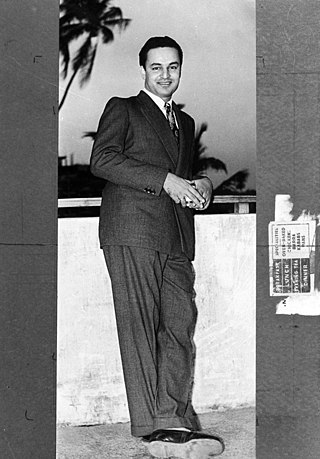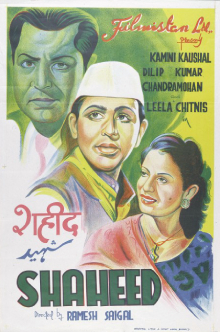Related Research Articles

Mohammed Rafi was an Indian playback singer and musician. He is considered to have been one of the greatest and most influential singers of the Indian subcontinent. Rafi was notable for his versatility and range of voice; his songs varied from fast peppy numbers to patriotic songs, sad numbers to highly romantic songs, qawwalis to ghazals and bhajans to classical songs. He was known for his ability to mould his voice to the persona and style of the actor lip-syncing the song on screen in the movie. He received six Filmfare Awards and one National Film Award. In 1967, he was honored with the Padma Shri award by the Government of India. In 2001, Rafi was honoured with the "Best Singer of the Millennium" title by Hero Honda and Stardust magazine. In 2013, Rafi was voted for the Greatest Voice in Hindi Cinema in the CNN-IBN's poll.

Suraiya Jamal Sheikh, mononymously known as Suraiya, was an Indian actress and playback singer who worked in Hindi films. In a career spanning from 1936 to 1964, Suraiya acted in over 70 films and sang 338 songs. Regarded among the finest and greatest actresses in the history of Indian cinema, she was known for her strong on-screen portrayals. Suraiya was the most celebrated actress between the mid- to late 1940s and early 1950s and was paid more than her male counterparts.

Mukesh Chand Mathur, better known mononymously as Mukesh, was an Indian playback singer. Mukesh is considered to be one of the most popular and acclaimed playback singers of the Hindi film industry. Amongst the numerous nominations and awards he won, his song "Kai Baar Yuhi Dekha Hai" from the film Rajnigandha (1973) won him the National Film Award for Best Male Playback Singer.

Kundan Lal Saigal, often abbreviated as K. L. Saigal, was an Indian singer and actor who worked in Hindi cinema|, which was centred in Calcutta (Kolkata) during Saigal's time, but is currently based in Bombay (Mumbai). Saigal's unique voice quality which was a mixture of baritone and soft tenor was the benchmark for most of the singers who followed him. In fact it remains the gold standard even today shining through very early and practically primitive recording technology.

Mohammed Zahur Khayyam Hashmi, better known mononymously as Khayyam, was an Indian music director and background score composer whose career spanned four decades.

Abdul Hayee, popularly known by his pen name (takhallus) Sahir Ludhianvi, was an Indian poet who wrote primarily in Urdu in addition to Hindi. He is regarded as one of the greatest film lyricist and poets of 20th century India.

Madan Puri was an Indian actor of Hindi and Punjabi films. His brothers were actors Chaman Puri and Amrish Puri. As a character actor mainly in negative roles (villain), he acted in about 430 films in a career spanning above fifty years.

Shaheed is a 1948 Bollywood Indian romance film, written and directed by Ramesh Saigal. The film depicts India's struggle for independence. It starred Dilip Kumar, Kamini Kaushal, Chandra Mohan, and Leela Chitnis. It had music by Ghulam Haider. Shaheed was the second highest grossing Indian movie of 1948.

Zehreela Insaan is a 1974 Indian Hindi-language romance film directed by Puttanna Kanagal and produced by Virendra Sinha. The film stars Rishi Kapoor, Moushumi Chatterjee, Neetu Singh and Pran. It is a remake of Kanagal's own 1972 Kannada film Naagarahaavu which was based on three Kannada novels: Nagarahavu, Ondu Gandu Eradu Hennu and Sarpa Mathsara, all written by T. R. Subba Rao.
Nashad was a film composer and music director of Indian and Pakistani film industry. He composed music for Hindi films in the 1940s and 1950s, credited on-screen under the names Nashad and then later migrated to Pakistan in 1964.

Husn Lal and Bhagat Ram were the first legendary music directors duo in Bollywood. They are two brothers, Husn Lal and Bhagat Ram.
Tadbir (transl. Fate) is a 1945 Indian Hindi language film. It was the fifth-highest-grossing Indian film of 1945. The film was directed by Jayant Desai under his Jayan Desai Productions banner and had music composed by Lal Mohammed, with lyrics written by Swami Ramanand Saraswati. The film starred K. L. Saigal, Suraiya, Mubarak, Jillobai, Rehana and Shashi Kapoor.

Parwana (transl. Moth) is a 1947 Indian Hindi-language drama film. It was produced by R. B. Haldia and Pratap A. Rana, and directed by J. K. Nanda. The songs were composed by Khurshid Anwar and became popular. The lyrics were written by D. N. Madhok and Naqshab. The film starred K. L. Saigal, Suraiya, Najma, K. N. Singh, Baby Khurshid and Azurie. It was K. L. Saigal's last film and was released in February 1947, one month after his death in January 1947. Suraiya, who had stated in an interview that she was a big fan of Saigal's, and had already acted in two films with him. The first two were Tadbir (1945) and Omar Khaiyyam (1946). Parwana was their third film together and the most famous.

Dushman is a 1939 Hindi social romantic drama film. It was directed by Nitin Bose for New Theatres Calcutta Production. The film starred K. L. Saigal, Leela Desai, Najmul Hassan, Prithviraj Kapoor, Nemo and Jagdish Sethi. The music was composed by Pankaj Mullick and the lyrics were written by Arzu Lucknavi. Nitin Bose besides directing also wrote the story and wielded the camera for the film. The dialogue writer was Sudarshan. The story subject about tuberculosis was suggested as a propaganda film by Viceroy Lord Linlithgow and his wife, who were then the Chairman and Patron of King George’s Tuberculosis Fund.
Zinda Lash is a 1932 Indian costume drama directed by Premankur Atorthy. The film was produced by New Theatres Ltd. Calcutta. The cast of the film included K. L. Saigal, Rattan Bai, Pahari Sanyal, Mahajabin, Nawab, Kumar and Radharani. The music direction was by R. C. Boral. B. N. Sircar started New Theatres Ltd. Calcutta in 1930 and produced his first film in Bengali, Dena Paona in 1931. In 1932 he produced films in Hindi where he introduced K. L. Saigal to Indian Cinema. The first was Mohabbat Ke Ansu and the second was Zinda Lash both directed by Premankur Atorthy. K. L. Saigal changed his name for his first three films and was billed as Saigal Kashmiri to prevent his family from finding out his profession. This film like his earlier Mohabbat Ke Ansu was not successful at the box office.
Subah Ka Sitara is a 1932 Urdu/Hindi romantic costume film from India. It was directed by Premankur Atorthy for New Theatres Ltd. Calcutta. Subah Ka Sitara was the third of the three films with which K. L. Saigal started his acting career in 1932. The first was Mohabbat Ke Ansu and the second was Zinda Lash. Like the first two films, Saigal used the name Saigal Kashmiri in the credit roll of the film. The film starred K. L. Saigal, Rattanbai, Mazhar Khan, Ali Mir Kumar, Radhabai, and Siddiqui. The music was by R. C. Boral. This was also actor Kumar’s second film, the first being Zinda Lash with Saigal in the lead role. Kumar’s name appeared in the credit roll as Ali Mir and it was from his third film Puran Bhagat that he changed his screen name to "Kumar".

Surendra was an Indian singer-actor of Hindi films. Known by his mononym, Surendra was born and educated in Punjab to be a lawyer by profession. He came to Bombay to become a singer on the recommendation of a Delhi distributor and his friends. He was "picked" by Mehboob Khan whom he met at Sagar Movietone, to sing and act in films as an alternative to the then Calcutta-based singer-actor, K. L. Saigal. Surendra started his career with his debut starring role in Deccan Queen (1936), directed by Mehboob Khan. He soon became a part of Sagar Movietone when his song "Birha Ki Aag Lagi More Man Mein" from the film became an "instant hit".
References
- ↑ "Omar Khayyam". atulmovies. 18 June 2012. Retrieved 1 November 2019.
- ↑ "Bollywood Hindi Movie". Archived from the original on 2 March 2021.
{{cite web}}: CS1 maint: unfit URL (link) - ↑ Rajadhyaksha, Ashish; Willemen, Paul (1999). Encyclopaedia of Indian cinema . British Film Institute. ISBN 9780851706696 . Retrieved 25 April 2013.
- ↑ "Omar Khaiyyam Songs". cinestaan. Archived from the original on 1 November 2019. Retrieved 1 November 2019.